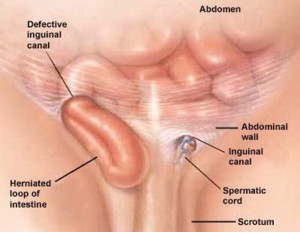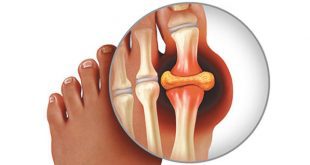No More Recurring Hernias


The most common types are inguinal (inner groin), incisional (resulting from an incision), femoral (outer groin), umbilical (belly button), and hiatal (upper stomach).
- In an inguinal hernia, the intestine or the bladder protrudes through the abdominal wall or into the inguinal canal in the groin. About 80% of all hernias are inguinal.
- In an incisional hernia, the intestine pushes through the abdominal wall at the site of previous abdominal surgery.
- A femoral hernia occurs when the intestine enters the canal carrying the femoral artery into the upper thigh.
- In an umbilical hernia, part of the small intestine passes through the abdominal wall near the navel.
- A hiatal hernia happens when the upper stomach squeezes through the hiatus, an opening in the diaphragm through which the esophagus passes.
Ultimately, all hernias are caused by a combination of pressure and an opening or weakness of muscle or fascia: The pressure pushes an organ or tissue through the opening or weak spot. Sometimes the muscle weakness is present at birth; more often, it occurs later in life. Poor nutrition, smoking, and overexertion all can weaken muscles and make hernias more likely. Anything that causes an increase in pressure in the abdomen can then cause a hernia, including obesity, lifting heavy objects, diarrhea or constipation, or persistent coughing or sneezing.
Hernias are typically easy to resolve with a laparoscopic surgery procedure. Unfortunately there are some people who suffer with recurring hernias, even after multiple surgeries. These patients can quickly become frustrated and discouraged, seeking treatment from various doctors, only to have their hernia recur again and again. It may take just a few months or sometimes even years for the hernia to reappear, no matter the length of time between occurrences a hernia that keeps coming back can become trying and patients may lose confidence in doctors.
Alas, there is good news for patients with recurring hernias. These patients can now elect to have the abdominal wall reconstructed; results from this surgery procedure are highly successful at preventing the hernia from recurring. The weak area of the abdominal wall is surgically closed and reconstructed during this type of procedure.
There are few surgeons who accept the challenging recurring hernia cases and perform the reconstructive surgery. Until recently, people suffering from this condition had to be transferred out of the area for this life changing surgery. Fortunately Dr. Bada, who has completed and received certification from the Comprehensive Solutions in Complex Abdominal Wall Reconstruction Master class in Nevada, can perform this surgery locally. Patients no longer need to seek help from doctor after doctor nor do they need to travel out of the area for relief from recurring hernias. Dr. Bada has seen great success with the reconstructive procedure and his patients are now hernia free!
If you suffer from recurring hernias and other doctors or surgeons have been unsuccessful at keeping them away, abdominal wall reconstruction may be the answer you have so desperately been seeking. All hope is not lost, for an evaluation to see if you would be a candidate for this procedure please call 941-255-0069.
Alvaro R. Bada, M.D. | (941) 255-0069 www.badamd.com . www.refluxbadamd.com
 Southwest Florida's Health and Wellness Magazine Health and Wellness Articles
Southwest Florida's Health and Wellness Magazine Health and Wellness Articles

